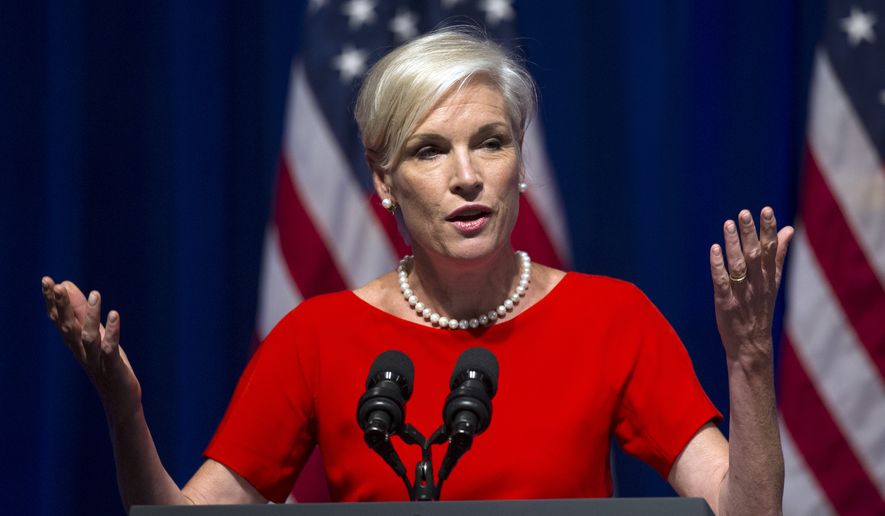Even Planned Parenthood supporters and customers are shocked when they view the undercover videos showing organization officials negotiating the sale of aborted fetal tissue, according to a series of focus groups whose findings were shared with The Washington Times.
The focus groups were sponsored by the Center for Medical Progress, the group that taped the undercover videos.
Kellyanne Conway, who conducted the poll, said she played it straight with the participants, who were carefully selected to make sure they weren’t strongly pro-choice or pro-life. Ms. Conway said she was struck by the participants’ reactions of disgust at an organization that many of them used.
“These Planned Parenthood customers — there’s a special level of frustration and disgust because they’ve been defending Planned Parenthood as providing vital services for years. Now they feel betrayed and disgusted,” Ms. Conway said in a telephone interview, describing the two focus group sessions in Denver.
Participants, some of whom use Planned Parenthood for birth control or other services, were generally supportive of the organization, but some who had heard about the undercover videos came into the focus groups saying they were uncomfortable with the accusations raised by the videos, said Ms. Conway, founder and president of the polling company, inc./WomanTrend.
Ms. Conway showed the groups a two-minute trailer combining short clips from a number of videos that the Center for Medical Progress had released and then an 11-minute video from footage taken at Planned Parenthood of the Rocky Mountains showing Dr. Savita Ginde talking about the availability of aborted fetal parts from her clinic.
SEE ALSO: Planned Parenthood hearing veers between talk of ‘gruesome’ abortions and gun control
After those videos, the sentiment in the focus groups turned much more negative. One organization supporter questioned whether Planned Parenthood was the neutral counselor she believed it to be, and several participants speculated that profiteering could lead clinics to pressure women who are unsure about their decisions to lean in favor of abortion.
Some of the women wanted those in the videos to be prosecuted, and all of the participants thought the Planned Parenthood officials caught on tape should lose their jobs.
Officials at the Planned Parenthood Federation of America didn’t respond to multiple messages left over several days seeking comment on the findings.
Publicly, the organization has accused the Center for Medical Progress of misleading editing and has defended its operations as legal.
A report commissioned by Planned Parenthood and conducted by Fusion GPS research firm found that the videos were indeed edited and that Center for Medical Progress staffers made errors in transcribing the closed-captioning of the conversations they recorded.
“The numerous errors, discrepancies, and omissions in the CMP transcripts render them useless as ’evidence.’ They also cannot be relied upon in official inquiries as a credible text record of what is said in the videos,” Fusion concluded.
The White House and defenders of Planned Parenthood in Congress have accepted its critique of the videos.
But the focus group participants were less likely to brush aside the videos based solely on accusations of manipulation. Even though a few participants thought the videos were doctored or part of a conspiracy, the focus groups wanted the Planned Parenthood officials involved to lose their jobs.
They generally rejected Planned Parenthood President Cecile Richards’ initial apology for the videos, saying even if there is an effort to entrap the organization, it needs to combat that with transparency.
“The most important thing that can be done is for more people to see these videos, because most have not. It’s like a magical elixir that shifts the burden of proof onto Planned Parenthood,” Ms. Conway said.
She found other surprising details in the focus groups, including the striking overlap for those who described themselves as moderately pro-life and those who said they were moderately pro-choice: In both cases, that stance generally meant they opposed abortions except in cases of rape or incest, or when the life of the mother was at risk.
Some also wanted abortion to be legal in the first trimester for teenage girls.
Ms. Conway dubbed that the “pro-choice light” position.
The focus groups also said it was not only acceptable, but also good, for women — especially young women — to see sonograms before making the final decision to have an abortion.
• Stephen Dinan can be reached at sdinan@washingtontimes.com.




Please read our comment policy before commenting.